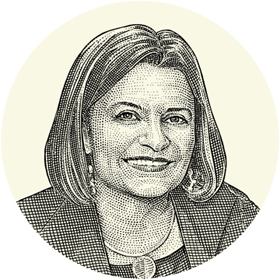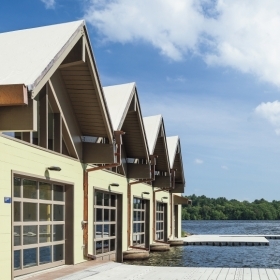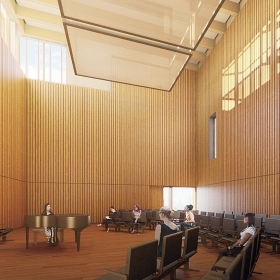
Wellesley is an institution that has refused to accept the status quo since its founding. For 140 years, the College has given women a uniquely inspiring learning environment in which to prepare for ambitious futures and drive change across the globe. Today, students depart into a transformed world. Information travels at the speed of a keystroke, and the world seems smaller even as our knowledge about it expands and new fields of inquiry demand our attention. These changes require us to be ambitious on behalf of our students and our faculty, deliberate as we set priorities, and confidently aspirational in how we conceive of Wellesley’s future.
As I look ahead to the coming year, I will be focused on Wellesley and the future.
Campus Renewal
Campus renewal, while preserving what is best about our buildings and landscape, will transform our living, learning, and research spaces.
We are well begun on this process. A beautifully restored Schneider Center is enhancing an already vibrant part of campus. In the first phase of our Founders and Green Hall renovation, humanities classrooms and faculty offices were updated, and dispersed academic departments were brought together. We celebrated health and wellness at Wellesley with a spectacularly renovated field house and with the refurbished boathouse given by Alice Lehmann Butler ’53 and her husband, John. Our current Pendleton West project will foster new connections between music and the visual arts.
This year, we are planning renovations in the Science Center and greenhouses, and in some residence halls. These projects will ensure that our spaces best serve students and faculty for years to come.
Career Services
We all know the enormous value of a Wellesley education, but it is important to make a strong public case for it. We do that most effectively by ensuring that our students have the opportunities they need to explore the full range of disciplines, and by ensuring that our career-services model is appropriate for today’s challenging landscape. Building on our strong network of committed alumnae, faculty, and staff, we are reimagining career services at Wellesley.
The resulting center will focus on developing the whole person. It will encourage students to reflect on and articulate the relationship of their Wellesley education to their lives. The center will mobilize alumnae and collaborate with faculty and staff. It will promote Wellesley as a preferred source of outstanding candidates for employers in every field. And it will allow Wellesley to model the relevance of liberal-arts education to career success by demonstrating the capacity of our graduates to be immediate contributors in every industry and enterprise.
We are currently searching for a new director for this center. I am excited about the potential for this more holistic approach to career services; it will be important for students and alumnae for many years in the future.
Many Students, One Wellesley
Interacting with and learning from community members with diverse majors, viewpoints, ideas, backgrounds, and experiences are critical to a liberal-arts education. We must continue to make sure that such interaction flourishes at Wellesley and that our students are exposed to the broadest range of disciplines possible. We continue to focus on ensuring that our students become the best versions of themselves through full participation in the Wellesley experience.
For instance, our WellesleyPlus program, aimed at first-generation college students and those from underresourced high schools, is expanding in size and scope to offer paid summer internships, in addition to supporting the transition to college. And a new effort in the sciences—where, nationally, those from underrepresented groups do not persist in the field at the same rate as their peers—has more than doubled the number of Summer Science Research students from traditionally underrepresented groups.
Additionally, recent national events have made it increasingly clear that we need a renewed dialogue about issues of race, ethnicity, and equity, including at Wellesley. Last semester, I formed a presidential commission to address these areas, and to improve recruitment and retention of faculty, staff, and students from underrepresented groups. We also continued a series of campus conversations on national and international events, which provide opportunities to model difficult dialogues on campus.
My announcement last spring that I will be leaving Wellesley in July 2016 has not changed our focus or priorities—or the speed with which we are moving ahead! I look forward to making this coming year my best one yet.





